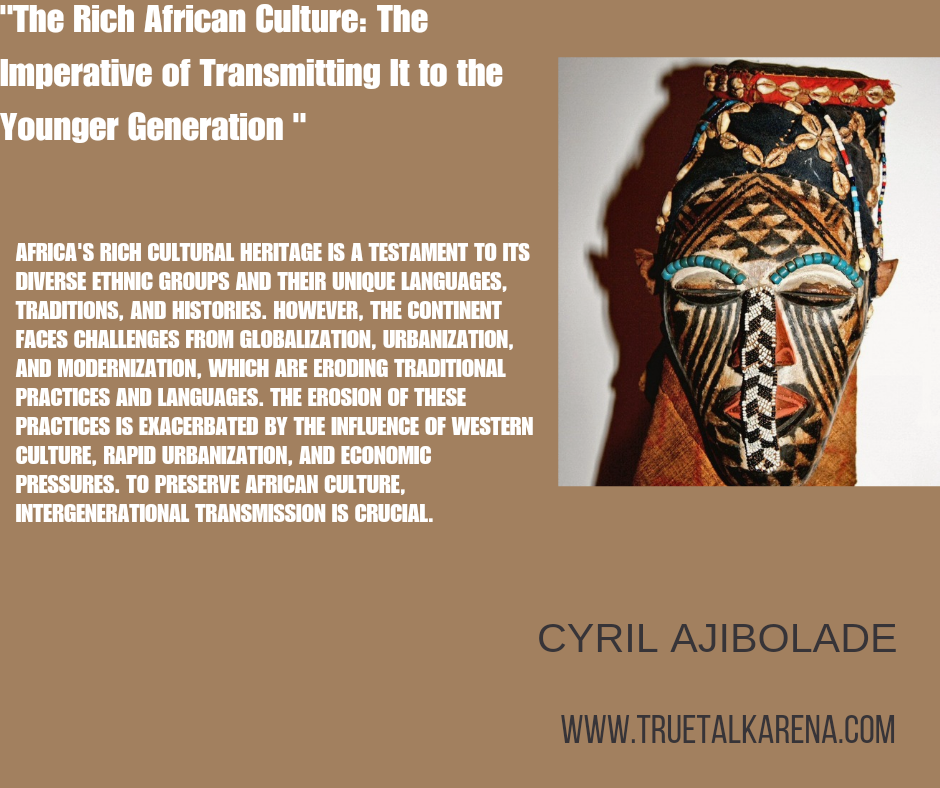
THE RICH AFRICAN CULTURE: THE IMPERATIVE OF TRANSMITTING IT TO THE YOUNGER GENERATION
Africa, often referred to as the cradle of humankind, is a continent brimming with a rich and diverse cultural heritage. This cultural mosaic is a tapestry woven from the threads of thousands of distinct ethnic groups, each with its own unique languages, traditions, and histories.
The cultural wealth of Africa is not only an asset to the continent but to the entire world. However, in the face of globalization and rapid modernization, there is an urgent need to preserve this invaluable heritage and transmit it to the younger generation. This essay delves into the richness of African culture, the challenges it faces, and the crucial role of intergenerational transmission in ensuring its continuity.
The Richness of African culture.African culture is characterized by a profound diversity that spans across music, dance, art, literature, and social norms. From the rhythmic beats of West African drums to the intricate beadwork of the Maasai, from the oral storytelling traditions of the Griots to the spiritual rituals of the San people, African culture is a vibrant expression of human creativity and resilience.
Language and Oral Traditions.Africa is home to over 2,000 languages, making it the most linguistically diverse continent. These languages are not just modes of communication but are carriers of cultural identity and traditional knowledge. Oral traditions, including folktales, proverbs, and epic narratives, play a crucial role in preserving history and moral values. Griots, the traditional storytellers in West Africa, for instance, are revered for their role in maintaining the historical consciousness of their communities through oral poetry and music.
Music and Dance.Music and dance are integral to African life, serving not just as entertainment but as vital components of religious, social, and political ceremonies. African music, with its complex rhythms and use of a wide variety of instruments, has influenced global genres such as jazz, blues, and reggae. Dance, too, is a powerful form of expression, often used to communicate communal values, celebrate life events, and honor ancestors.
Art and Craft.African art, encompassing sculpture, pottery, textiles, and beadwork, reflects the spiritual and social lives of its people. Masks and sculptures often have ceremonial purposes, embodying deities or representing ancestral spirits. The symbolism and aesthetic principles embedded in African art have also had a profound impact on modern art movements worldwide.
CHALLENGES TO CULTURAL PRESERVATION :
Despite its richness, African culture faces significant threats from both internal and external forces.
Globalization, urbanization, and modernization are leading to the erosion of traditional practices and languages. Young Africans are increasingly adopting Western lifestyles and values, often at the expense of their own cultural heritage.
Globalization and Western influence.The pervasive influence of Western culture, propagated through media, education, and technology, has led to a homogenization of cultural expressions. Traditional African music, for example, is being overshadowed by Western pop music, and indigenous languages are being replaced by global languages like English and French.
Urbanization and Migration.Rapid urbanization and migration have also contributed to the dilution of traditional cultures. As people move to cities in search of better economic opportunities, they often leave behind their rural lifestyles and practices. This displacement can lead to a loss of cultural continuity, as urban environments may not support the same cultural activities and social structures as rural communities.
Economic Pressures.Economic challenges in many African countries have further exacerbated the situation. The struggle for daily survival often takes precedence over cultural preservation. Traditional artisans and cultural practitioners may abandon their crafts for more lucrative occupations, leading to a decline in the transmission of these skills.
The Role of Intergenerational Transmission:
To safeguard Africa's cultural heritage. It is imperative to foster a robust process of intergenerational transmission. This involves active efforts by the older generation to pass down cultural knowledge, values, and practices to the younger generation. Several strategies can be employed to achieve this.
Education and Schools.Incorporating African culture into the formal education system is a crucial step. Schools should teach local languages, traditional history, and cultural practices alongside conventional subjects. This approach not only instills a sense of pride and identity in young Africans but also ensures that they are well-versed in their heritage.
Community Involvement.Community-based initiatives play a vital role in cultural preservation. Festivals, cultural events, and community gatherings provide platforms for the younger generation to engage with their cultural heritage. These events often involve traditional music, dance, and storytelling, allowing young people to experience and participate in their culture firsthand.
Technology and Media.Inthe digital age, technology and media can be powerful tools for cultural preservation. Documenting traditional practices through video, audio recordings, and digital archives can create accessible resources for future generations. Social media platforms can also be used to promote cultural awareness and engagement among young people.
Family and Elders.The family unit remains a cornerstone of cultural transmission. Elders, as custodians of cultural knowledge, play a crucial role in educating the youth. Storytelling, teaching traditional skills, and involving children in cultural practices from an early age help embed cultural values and traditions.
In Conclusion,Preserving African culture through intergenerational transmission is not merely a cultural imperative but a necessity for maintaining the continent's identity and heritage. As Africa navigates the complexities of modernity and globalization, it is crucial to strike a balance between embracing progress and honoring tradition. By actively engaging the younger generation in cultural preservation efforts, Africa can ensure that its rich and diverse heritage continues to thrive for generations to come. The collective responsibility of families, communities, educators, and policymakers is to create an environment where African culture is celebrated, sustained, and passed down, keeping the vibrant spirit of the continent alive.



0 COMMENTS